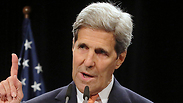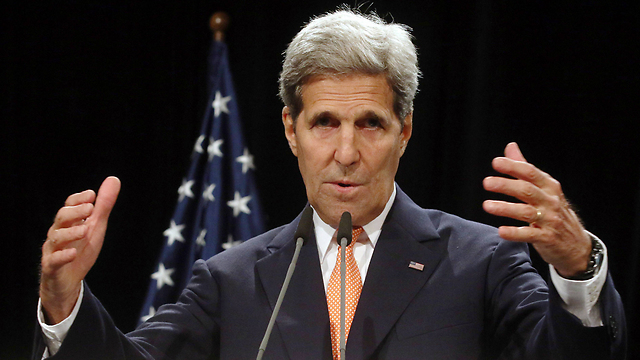
Iran deal begins long and arduous journey through Congress
Facing an uphill battle in a Republican congress, and a possible no vote, Kerry attempts to convince the skeptics of the Iran deal's viability.
Testifying before Congress for the first time since world powers reached the landmark accord with Iran last week, America's top diplomat was confronted head-on by Republican accusations that Iranian negotiators had "fleeced" and "bamboozled" him.
The vitriolic exchanges on Capitol Hill reflected a hardening of positions as Congress opened a 60-day review of the deal considered crucial to its fate.
Iranian hardliners are also trying to undermine the pact, which Israel has condemned as a dire security threat.
Opening the hearing on a contentious note, the committee's Republican chairman, Bob Corker, criticized Kerry for the terms he negotiated. "I believe that you've been fleeced," he said.
Corker chided Kerry and other administration officials for their line of argument that the only alternative to the accord would be more war in the Middle East, saying that the real alternative would be a better deal.
Senator Marco Rubio faulted President Barack Obama for rewarding Iran for "its atrocious human rights record."
"This is a deal whose survival is not guaranteed beyond the current term of the president," said Rubio, a 2016 Republican presidential candidate.
Senator Ben Cardin, the top Democrat on the committee, said he has not yet decided how he would vote but that he felt that "our negotiators got an awful lot."
"We can't bomb that knowledge away"
Kerry insisted that critics of the deal, which curbs Iran's nuclear program in return for sanctions relief, are pushing an unrealistic alternative that he dismissed as a "sort of unicorn arrangement involving Iran's complete capitulation."
"The fact is that Iran now has extensive experience with nuclear fuel cycle technology," Kerry told the Senate Foreign Relations Committee. "We can't bomb that knowledge away. Nor can we sanction that knowledge away."
Kerry said that if Congress rejects the agreement reached in Vienna, "the result will be the United States of America walking away from every one of the restrictions we have achieved and a great big green light for Iran to double the pace of its uranium enrichment."
"We will have squandered the best chance we have to solve this problem through peaceful means," he said.
Treasury Secretary Jack Lew and Energy Secretary Ernest Moniz also testified as part of an effort to sell the deal to lawmakers, as well as to the American public and uneasy Middle East allies.
Responding to criticism that the agreement lifts sanctions too fast, Lew said it would not prevent the United States from imposing additional sanctions over issues such as human rights violations if deemed necessary.
Moniz, seeking to counter criticism that loopholes in international inspection will allow Iran to cheat, told lawmakers: "I am confident that the technical underpinnings of this deal are solid."
Seeking to reassure Israel and its US supporters, Kerry said Washington would increase security coordination.
Prime Minister Benjamin Netanyahu has expressed concerns that Iran will use unfrozen assets to increase funding and weapons to militant groups such as Hamas and Hezbollah.
Kerry said the Iran deal carried the "real potential" for change in the volatile Middle East but acknowledged it "does not end the possibility of a confrontation with Iran."
The United States, Russia, China, Britain, France, Germany and the European Union signed the deal with Iran.
Under a bill Obama reluctantly signed into law in May, Congress has until Sept. 17 to approve or reject the agreement. Republicans hold majorities in both houses of Congress, and many have come out strongly against the pact, which they say will empower Iran and threaten Israel.
Obama, who could gain a boost to his presidential legacy from his diplomatic outreach to US foe Iran, needs to convince as many of his fellow Democrats as possible to back the deal.
If a "disapproval" resolution passes and survives Obama's veto, he would be unable to waive most of the US sanctions imposed on Iran, which could cripple the nuclear pact.













